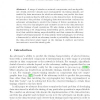Free Online Productivity Tools
i2Speak
i2Symbol
i2OCR
iTex2Img
iWeb2Print
iWeb2Shot
i2Type
iPdf2Split
iPdf2Merge
i2Bopomofo
i2Arabic
i2Style
i2Image
i2PDF
iLatex2Rtf
Sci2ools
82
Voted
ESORICS
2009
Springer
2009
Springer
Data Structures with Unpredictable Timing
Abstract. A range of attacks on network components, such as algorithmic denial-of-service attacks and cryptanalysis via timing attacks, are enabled by data structures for which an adversary can predict the durations of operations that he will induce on the data structure. In this paper we introduce the problem of designing data structures that confound an adversary attempting to predict the timing of future operations he induces, even if he has adaptive and exclusive access to the data structure and the timings of past operations. We also design a data structure for implementing a set (supporting membership query, insertion, and deletion) that exhibits timing unpredictability and that retains its efficiency despite adversarial attacks. To demonstrate these advantages, we develop a framework by which an adversary tracks a probability distribution on the data structure's state based on the timings it emitted, and infers invocations to meet his attack goals.
Algorithmic Denial-of-service Attacks | Data Structure | Data Structures | ESORICS 2009 | Security Privacy |
Related Content
| Added | 23 Nov 2009 |
| Updated | 23 Nov 2009 |
| Type | Conference |
| Year | 2009 |
| Where | ESORICS |
| Authors | Darrell Bethea, Michael K. Reiter |
Comments (0)

